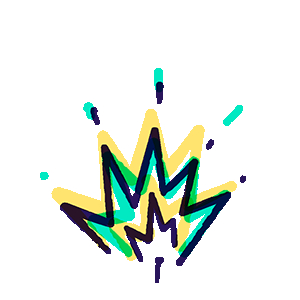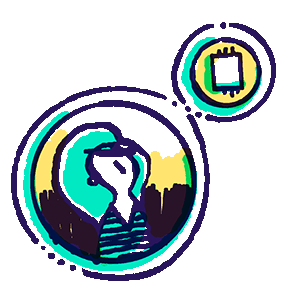Booklist
A series of books to help understand large language models, innovation and disruption to purpose-led organisations.

Understanding disruption
Competing Against Luck
by Clayton Christensen
Explores the concept of Jobs Theory to solve disruptive technologies through the lens of customer needs, helping businesses find new opportunities for growth.
Innovator's Dilemma
by Clayton Christensen
A groundbreaking work that explains why established companies struggle to adapt to disruptive technologies and offers strategies for overcoming this challenge.
Range
by David Epstein
Looking at how generalists triumph in a specialised world through the frame of sports, AI and parenting
The Myths of Creativity
by David Burkus
Debunks common misconceptions about creativity, revealing the true nature of innovation and how individuals and organizations can foster it.
Thinking in Systems
by Donella H. Meadows
A primer on systems thinking, demonstrating how to better understand and address complex problems by examining interconnected systems. Excellent descriptions of stocks and flows.

Tactics
Experimentation Works
by Stefan H. Thomke
Outlines the importance of experimentation in business, sharing actionable strategies for driving innovation and growth through continuous testing.
High-Impact Tools for Teams
by Alex Osterwalder, Stefano Mastrogiacomo
Offers practical tools and techniques for improving collaboration, communication, and productivity within teams.
Testing Business Ideas
by David J Bland
Provides a framework for rapidly testing and validating new business ideas, minimizing risk and maximizing success.
The Invincible Company
by Alex Osterwalder, Yves Pigneur
A three part book considering the importance of an innovation portfolio, business models that can shift and adapt, and the culture to drive it forwards
Upstream
by Dan Heath
Explores a number of social innovation interventions that address problems at their root causes, preventing issues before they arise and creating long-lasting, systemic change.

Strategy
Good Strategy / Bad Strategy
by Richard Rumelt
Distinguishes between effective and ineffective strategies, offering practical guidance for developing and implementing successful business plans. Entertaingly acerbic.
Principles
by Ray Dalio
Part memior, part manifesto this book lays out a number of simple principles to consider when making decisions.
The Corporate Startup
by Tendayi Viki, Dan Toma, Esther Gons
Demonstrates how established corporations can harness startup methodologies to drive innovation and stay competitive in a rapidly changing world.
The Fearless Organization
by Amy C Edmondson
Creating Psychological Safety in the Workplace for Learning, Innovation, and Growth
The Halo Effect
by Phil Rosenzweig
Challenges conventional wisdom on business success, debunking popular myths and revealing the true factors that drive performance.
The Lean Startup
by Eric Ries
Introduces the Lean Startup methodology, a process that helps entrepreneurs rapidly validate and iterate on their ideas for maximum success.

Strategic Foresight & Speculative Futures
From What Is to What If
by Rob Hopkins
Inspires readers to imagine alternative futures, offering practical tools and techniques for envisioning and creating a more sustainable world.
Homo Deus
by Yuval Noah Harari
Explores humanity's future in a world dominated by technology, examining the potential consequences and ethical implications of scientific advancements.
Superforecasting
by Philip E. Tetlock and Dan Gardner
Reveals the science and art of making accurate predictions, drawing on insights from expert forecasters to improve decision-making in uncertain times.
The Art of the Long view
by Peter Schwartz
Offers a guide to scenario planning, a strategic method for envisioning and preparing for various future possibilities.

Interaction principles
Misbehaving
by Richard H. Thaler
A deep dive into behavioral economics, showcasing how human psychology impacts decision-making and how understanding these biases can lead to better outcomes.
The Culture Map
by Erin Meyer
Explores cultural differences in communication and collaboration, offering a framework for effectively navigating cross-cultural business relationships.
The Design of Everyday Things
by Don Norman
Examines the principles of human-centered design, showing how intuitive and user-friendly products can improve everyday life.
The Power of Not Thinking
by Simon Roberts
Considers the fact that humans are 'emodied' creatures with intuition and skills that have evolved to match the fact we walk, eat and sleep. A riposte to the reductive idea that machines can mimic our interactions.
Thinking Fast and Slow
by Daniel Kahneman
Daniel Kahneman - who received a Nobel for his behavioural economics work - explores his theory of System 1 and System 2 thinking. The book looks at biases, heuristics and how humans make decisions.
Ways of Seeing
by John Berger
The cliché of all art-school kids but Berger's exploration of visual culture - and the examination of how we perceive and interpret images - is a useful primer for consider how Large Language Models seek to simulate that reality.

History
Be more Pirate
by Sam Conniff
Inspires readers to adopt the disruptive spirit of pirates, challenging conventional thinking and embracing innovation to create meaningful change.
Full House: The spread of excellence from Plato to Darwin
by Stephen Jay Gould
Considers how evolution comes in fits, starts and disruptions rather than the steady straight-line we tend to think of. There's a lot of baseball chat to argue the case!
Hello World: How to be human in the age of the machine
by Hannah Fry
Examines the implications of artificial intelligence and automation on society, considering how we can maintain our humanity in a technology-driven world.
Human Frontiers
by Michael Bhaskar
This book challenges the idea that society is getting more and more advanced. Bhaskar makes the compelling argument that the innovations from the 18th and 19th centuries were fare more important than those in the last 20 years. He sees AI as a potential way off of our plateau.
My Robot Gets Me
by Carla Diana
This looks at human-machine interactions from the perspective of physical product design with Diana framing the argument through hands-on experiments.
Napoleon's Buttons
by Penny Le Couteur
Explores the impact of chemistry on history, highlighting how specific compounds have shaped the course of human events. It takes a counterintuitive perspective to how disruption, and innovation, has been caused by little noticed details.
Sapiens
by Yuval Noah Harari
A broad view of human history. The books looks at what's shaped humans from the dawn of civilization to the modern era. As human-machine interactions become more widespread it's helpful to have a grounding in our histories.
 "
"
 "
"